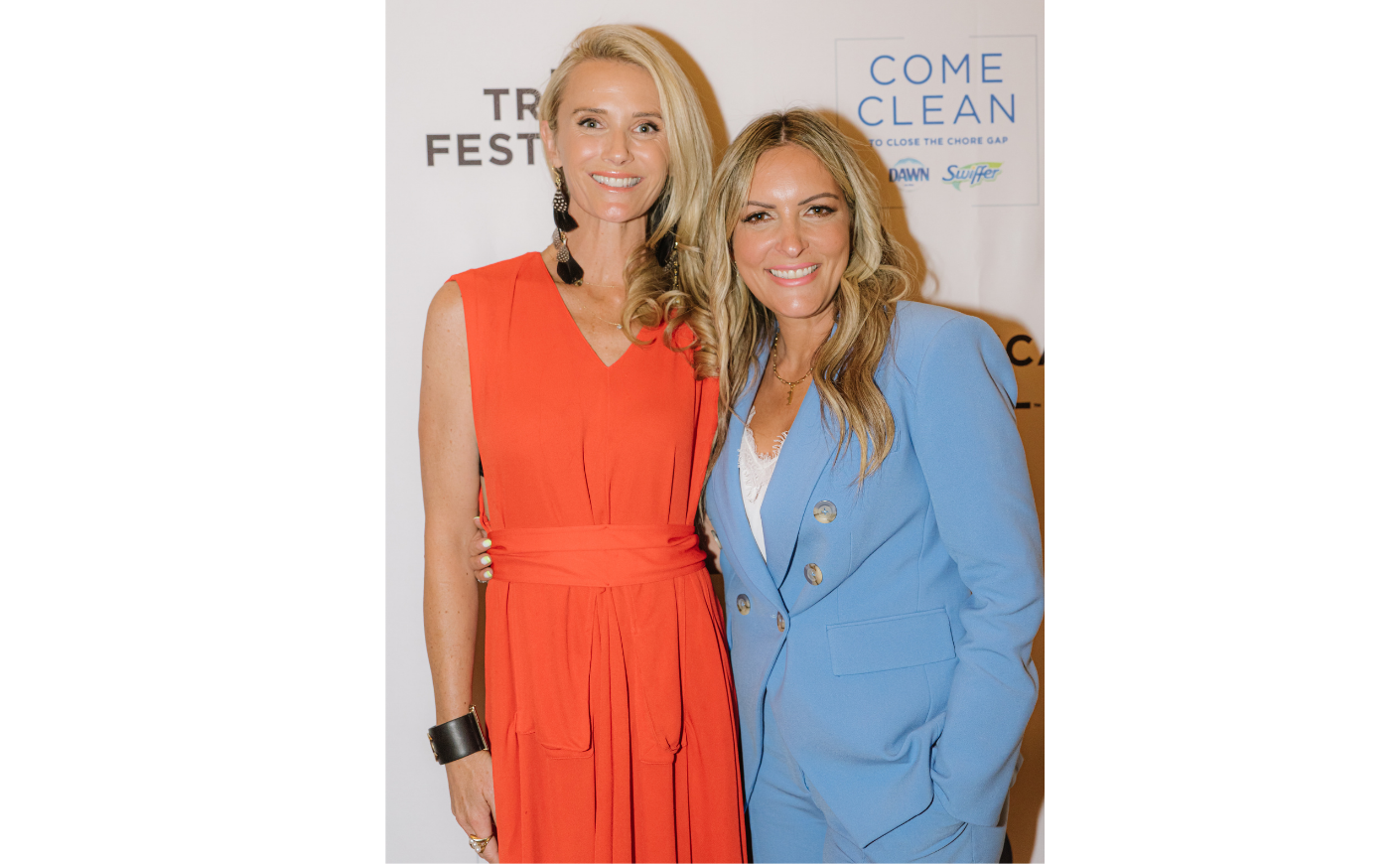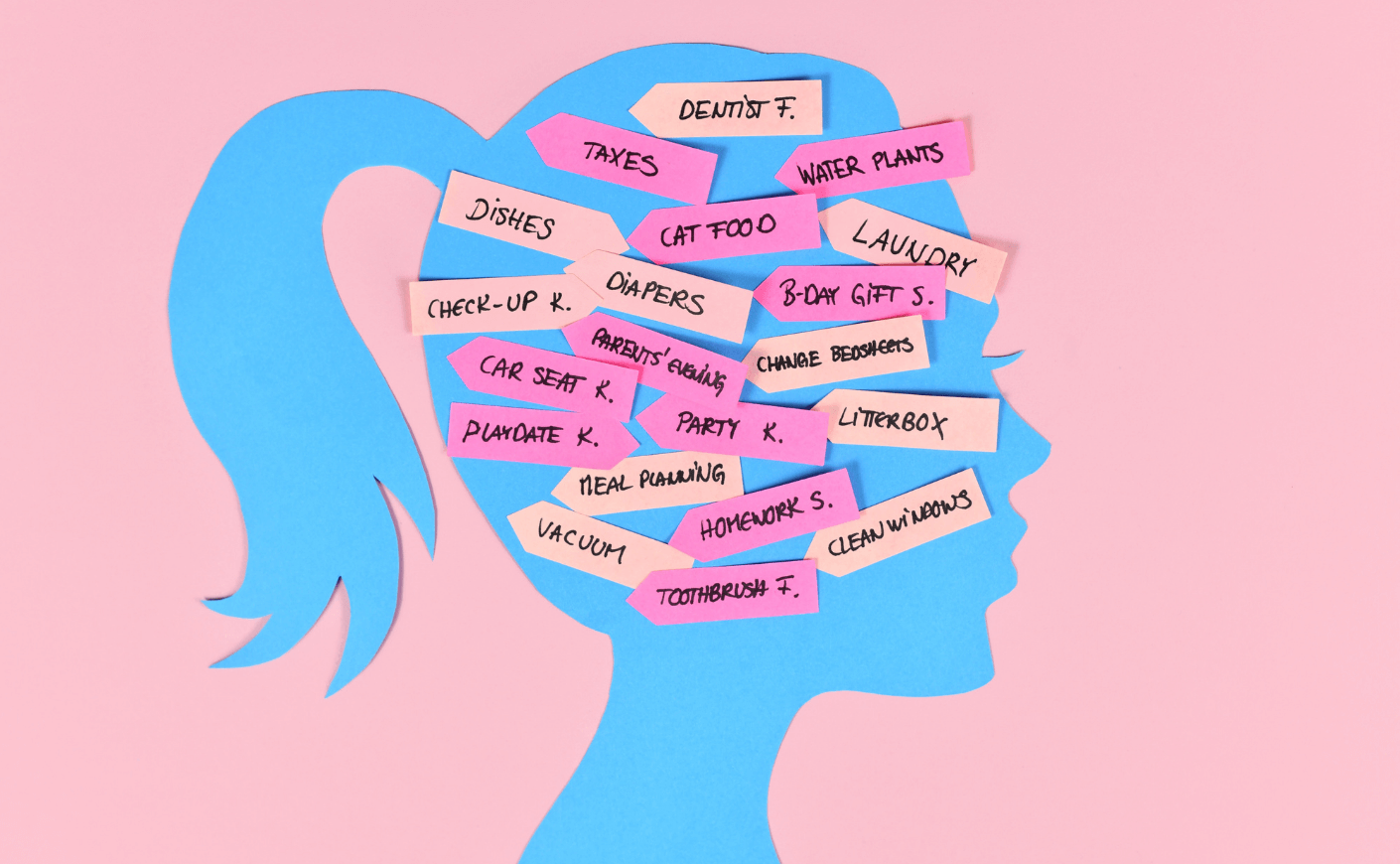Figuring out how to hit your work deadlines, keep the kids fed and house clean, and squeeze in a date night is enough to make anyone’s head spin. And because society has traditionally viewed women as the center of her family's universe, they’re frequently left shouldering an unfair (and unrealistic) amount of responsibility at home. Working moms are often tasked with spending what feels like the equivalent of another day's work managing the house long after they’ve closed their work laptops. Because who else will help get it all done?
That's the question explored in the new documentary Fair Play, based on Eve Rodsky's New York Times bestseller. Directed by filmmaker Jennifer Siebel Newsom (the First Partner of California), the film shines a light on how a lack of universal paid family leave, childcare, and healthcare in America leaves working moms juggling the majority of household chores and child-rearing, all while managing a full-time job.
"We have to create policies and structures and redesign the workplace to benefit working families, in particular working mothers," Newsom tells KCM. "If policy change at the federal level is going to continue to take more time, the quicker shift I'm hoping we'll see is fathers recognizing the need to play a larger role in care at home."
The documentary is supported by our friends at P&G, who recognize that sharing house labor is critical to successful family life, and have made a commitment to helping close the chore gap. "P&G has partnered with us for years because we both believe that equality in the world starts in the home — that for women to step into their full power in the world, we must ask men to step into their full power in the home," says Rodsky.

We chatted with Rodsky and Newsom about why it felt essential to shine a light on "invisible labor," the benefits of fathers shouldering more household responsibilities, and why "having it all" doesn't mean "doing it all."
KCM: What is "invisible labor" and why is it often not valued or acknowledged?
Eve Rodsky: How can you value what you can’t see? “Invisible work” has evolved to mean the behind-the-scenes work that keeps a home and family running smoothly, although it’s hardly noticed and is rarely valued. Another term often used to describe this work is “emotional labor.” This term has evolved from its original meaning to encompass the maintaining-relationships and managing-emotions domestic work, like calling in-laws, sending thank-you notes, buying teachers’ gifts, and soothing a child’s meltdown in Target. The problem is that these meaningful acts take significant amounts of time, and women are doing most of them.
How does an unequal split of labor at home lead to resentment among partners?
ER: When you’re married or in a partnership, no one person should be expected to “hold all the cards,” or even come close, regardless of whether both people work outside the home. Running a household is more than a full-time job. When you make assumptions instead of structured decision-making, that’s where the problems occur.
Before Fair Play, my husband would tell people he was “in charge of” extracurricular sports for our two sons, Zach and Ben. I would feel incredible resentment because what meant to him was that he’d take them to their Little League games on Sundays. That’s it. Meanwhile, behind the scenes, I was running around handling dozens of invisible tasks: filling out the Little League registration forms; arranging a carpool for after-school practice; picking up the kids’ uniforms from the team office; printing out, signing and making copies of release forms; buying cleats; returning cleats when they were the wrong size; and on and on. Fair Play is based on full ownership of the cards in your hand — from conception to planning and execution, where everything required to handle the full card is discussed beforehand, including our minimum standard of care, like sunscreen and a helmet. Now when my husband says he’s in charge, he truly is in charge. I still get to show up to cheer on my sons, but I’m free of hours and hours of work — and that’s just one card.
Why do men and women often have differing views on what it means to share responsibility around the house?
ER: Do you believe that an hour holding your child’s hand in the pediatrician’s office is just as valuable to society as an hour in the boardroom? When I’ve asked dozens of men this question in private, the answer is often “No.” Men are coming to the table with a historical context of housework from generations of inequality. Yet, these same men are also reporting dissatisfaction in the home. What you’ll see in Fair Play is what happens when men step into their full power in the home, and how this move creates life-changing positive impacts for men, women, and the family as a whole.
What are the benefits of men sharing more responsibility at home?
Jennifer Siebel Newsom: When you look at the studies, if fathers did 40 percent of the household domestic and childcare, or 50 more minutes a day, what you end up finding is that they’re, on average, less likely to be on prescribed meds and antidepressants, they're healthier, they have greater longevity and better sex lives. Their marriages are stronger. Their wives are less anxious, less depressed, and have more time for their careers and more leisure time. Their wives are happier and their children have better cognitive development, healthier relationships, and fewer behavioral problems. There are so many benefits to dads stepping into care. It's kind of a no-brainer.
Every man who’s seen this film has come up to me to tell me how the film has transformed their behavior at home and how they're contributing more. That's really, really cool. Now we need these men, especially men who are leaders in the workforce — whether in the private or public sector — to model that behavior, parent out loud at work, and really help us as a society recognize and value that workers have lives outside of the workplace.
There’s so much pressure on women to “have it all.” Where does that pressure come from?
ER: We’ve been taught that “having it all” means “doing it all.” After thousands of conversations with women from all walks of life, women who report that even having the career-marriage-kid-combo they always dreamed of having isn’t making them happy. In fact, they report being “overwhelmed” and “bored.” As women, how we spend our time is predetermined, and it’s always in service of our roles as parents, partners, or professionals. But I’m here to tell you that we all have 24 hours in a day, and we all deserve the right to be interesting and interested in our own lives beyond those roles.












